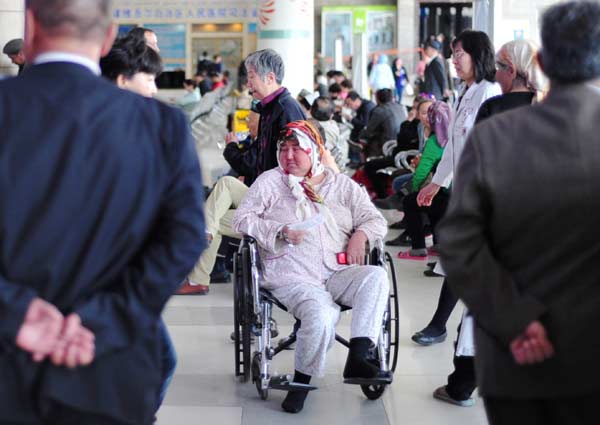 |
|
A patient waits at the Xinjiang People's Hospital. ZHU YI/CHINA DAILY |
Recruitment drive
Wang Faxing, the hospital president, said the hospital employs 50 doctors and nurses from the Kazak ethnic group, and will soon begin a recruitment drive to attract more staff from the Kazak, Uzbek and Russian ethnic groups as part of the expansion efforts along the modern-day Silk Road.
People from countries bordering Xinjiang have been receiving medical treatment in the region since the 1970s, but in 2008 the hospital established an international medical services department to provide greater assistance to expat patients, such as accompanying them during examinations and translating medical records and files, Wang said.
"The construction of 50 wards specially designed and allocated to the department will be completed in August, so we can provide the patients with tailored services provided by doctors and nurses fluent in Kazak, Uzbek and Russian. Fifty more wards will be built within two years," Wang said.
The aim is to house all foreign patients in one purpose-built facility, and reduce the need for staff to move between buildings to attend to patients in different departments, which is time-consuming and occasionally results in delays to treatment, he added.
Since 2008, more than 15,000 foreign patients have been treated at the hospital, with more than 4,000 of them staying at least one night. Most of the patients come from Kazakhstan, Tajikistan and Kyrgyzstan, and the number is expected to rise as the services and facilities are further improved, according to Wang.
A major factor in Assem's decision to travel from her home in Almaty is that the waiting times are long at public hospitals in Kazakhstan, and her condition means she cannot afford to wait several months for treatment. She had her operation just one week after being admitted to the Xinjiang People's Hospital. Ease of access was another reason. "It only takes 90 minutes to fly from Almaty to Urumqi. It's so convenient," she said.
Li Guoqing, head of the hospital's cardiology department, said the primary illnesses seen among patients from Central Asian countries are brain tumors, cancers, alcohol-related diseases and joint problems caused by obesity.
"After the Soviet Union collapsed in 1991, many Russian doctors left Kazakhstan, Tajikistan and Kyrgyzstan, causing severe shortages of medical practitioners in those countries. Also, economic problems mean the hospitals are unable to purchase the most advanced medical and surgical equipment, so the levels of medical care in those countries have fallen sharply compared with Xinjiang," said Li, who paid a visit to Kazakhstan in February.
Kazakhstan nationals used to travel to Germany, Israel or Russia for treatment of serious illnesses, but now many are opting to visit Xinjiang instead, because it's closer and the standards of care are high. Moreover, treatment costs are far lower in Xinjiang, and for certain types of surgery the fee is about one-third of that charged in German hospitals, according to Li.
